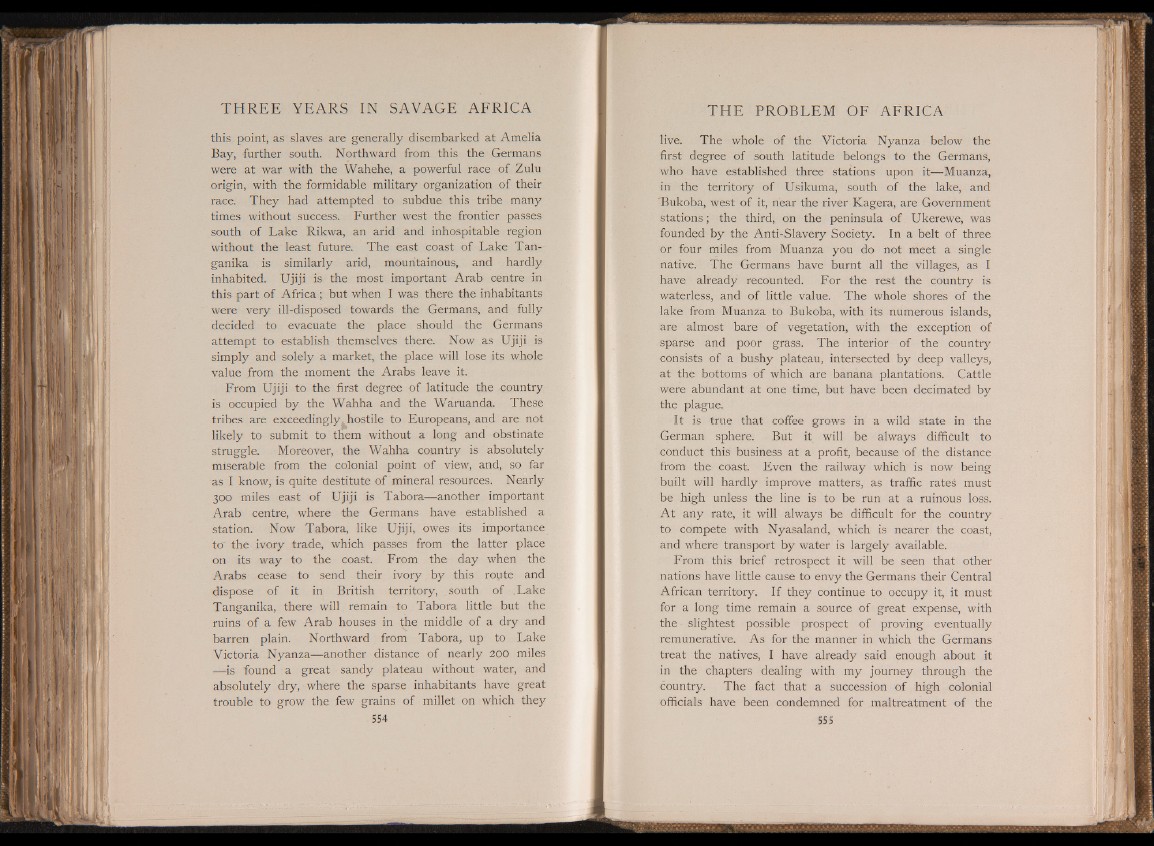
this point, as slaves are generally disembarked at Amelia
Bay, further south. Northward from this the Germans
were at war with the Wahehe, a powerful race of Zulu
origin, with the formidable military organization of their
race. They had attempted to subdue this tribe many
times without success. Further west the frontier passes
south of Lake Rikwa, an arid and inhospitable region
without the least future. The east coast of Lake Tan-
ganika is similarly arid, mountainous, and hardly
inhabited. Ujiji is the most important Arab centre in
this part of Africa; but when I was there the inhabitants
were very ill-disposed towards the Germans, and fully
decided to evacuate the place should the Germans
attempt to establish themselves there. Now as Ujiji is
simply and solely a market, the place will lose its whole
value from the moment the Arabs leave it.
From Ujiji to the first degree of latitude the country
is occupied by the Wahha and the Waruanda. These
tribes are exceedingly, hostile to Europeans, and are not
likely to submit to them without a long and obstinate
struggle. Moreover, the Wahha country is absolutely
miserable from the colonial point of view, and, so far
as I know, is quite destitute of mineral resources. Nearly
300 miles east of Ujiji is Tabora—another important
Arab centre, where the Germans have established a
station. Now Tabora, like Ujiji, owes its importance
to' the ivory trade, which passes from the latter place
011 its way to the coast. From the day when the
Arabs cease to send their ivory by this route and
dispose of it in British territory, . south of . Lake
Tanganika, there will remain to Tabora little but the
ruins of a few Arab houses in Idle middle of a dry and
barren plain. Northward from Tabora, up to Lake
Victoria Nyanza—another distance of nearly 200 miles
—is found a great sandy plateau without water, and
absolutely dry, where the sparse inhabitants have great
trouble to grow the few grains of millet on which they
554
live. The whole of the Victoria Nyanza below the
first degree of south latitude belongs to the Germans,
who have established three stations upon it—Muanza,
in the territory of Usikuma, south of the lake, and
"Bukoba, west of it, near the river Kagera, are Government
stations; the third, on the peninsula of Ukerewe, was
founded by the Anti-Slavery Society. In a belt of three
or four miles from Muanza you do not meet a single
native. The Germans have burnt all the villages, as I
have already recounted. For the rest the country is
waterless, and of little value. The whole shores of the
lake from Muanza to Bukoba, with its numerous islands,
are almost bare of vegetation, with the exception of
sparse and poor grass. The interior of the country
consists of a bushy plateau, intersected by deep valleys,
at the bottoms of which are banana plantations. Cattle
were abundant at one time, but have been decimated by
the plague.
It is true that coffee grows in a wild state in the
German sphere. But it will be always difficult to
conduct this business at a profit, because of the distance
from the coast. Even the railway which is now being
built will hardly improve matters, as traffic rates must
be high unless the line is to be run at a ruinous loss.
At any rate, it will always be difficult for the country
to compete with Nyasaland, which is nearer the coast,
and where transport by water is largely available.
From this brief retrospect it will be seen that other
nations have little cause to envy the Germans their Central
African territory. If they continue to occupy it, it must
for a long time remain a source of great expense, with
the • slightest possible prospect of proving eventually
remunerative. As for the manner in which the Germans
treat the natives, I have already said enough about it
in the chapters dealing with my journey through the
country. The fact that a succession of high colonial
officials have been condemned for maltreatment of the